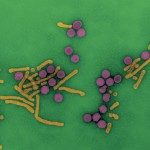Lien vers Pubmed [PMID] – 12818622
Comp. Immunol. Microbiol. Infect. Dis. 2003 Oct;26(5-6):357-72
Vaccine approaches against AIDS have focused on inducing cellular immune responses, since many studies revealed the role of T cell responses in the control of human immunodeficiency virus or simian immunodeficiency virus (SIV) infections. The experimental infection of rhesus macaques with SIV or chimeric SHIV is routinely used as a model for AIDS. In such models, DNA immunization is a tool to elicit specific T cell responses and to study their protective efficacy. DNA immunogenicity in primates depends on parameters such as level of antigen expression, choice of the antigen among SIV proteins, use of fusion proteins, route of immunization, and addition of adjuvants. Recent results suggest that priming with DNA and boosting with attenuated recombinant viral vectors, each expressing corresponding SIV antigens, leads to improved specific immunity and, in some cases, affords protection against pathogenic challenge. After preclinical evaluations, DNA has entered clinical trials for a therapeutic or prophylactic gene-based AIDS vaccine.

